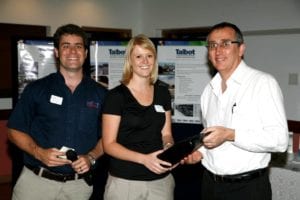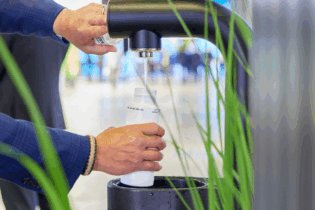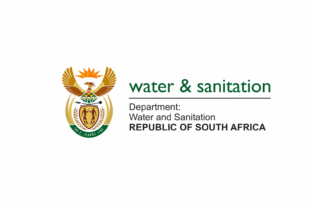Caption: Alistair Green, Talbot Operation Manager and Megan Schlebusch, Marketing Coordinator of Talbot & Talbot handing a gift of appreciation to speaker Chris Fennmore from eThekwini.
Water scarcity is undoubtedly one of the most significant challenges facing humanity over the next century. A rapidly growing population, changes in consumption patterns, increased competition due to expanding economies and unsustainable practices have resulted in declining water quality and placed increasing pressure on already limited water supplies. In addition, further stress due to the impact of climate change (namely increased variability in rainfall and runoff, increasingly higher mean annual temperatures and the rise in frequency and intensity of extreme weather events) is likely to exacerbate the situation. This was the theme of a recent workshop, hosted by Talbot & Talbot in association with WISA, which tackled the topic ‘Water supply in a Changing World’. Speakers from both the public and private sector were invited and addressed a well represented delegation to discuss issues relating to water supply and risk and the impact on future economic growth for the KwaZulu-Natal region. The key note speakers included Dr. Francois Talbot, Chairman of Talbot & Talbot; Dr. Bernard Talbot, Managing Director of Talbot & Talbot; Chris Fennemore, Director of eThekwini Water & Sanitation Wastewater unit; Emeritus Professor Roland Schulze from UKZN Centre for Water Resources Research specialising in climate change and Neal Bromley, Technical Director of Jeffares & Green. Dr. Francois Talbot kicked off the workshop, introducing the topic and reviewing present and future water supply concerns for the greater Durban metro. This was followed by Chris Fennemore from the EThekwini Municipality, who outlined the challenges being faced by the municipality’s water and sanitation unit. Currently, the discharge or overflow of storm water into sewer systems is the biggest problem, as this hydraulically overloads both the sewer networks and treatment works and introduces sand, silt litter and solid waste into the sewer. There was also a strong emphasis on the need for improved waste minimisation and water reuse as a means of augmenting scarce water supplies in the future. The onus being on industry to improve waste and effluent management so that the wastewater discharged to either municipal systems or directly to the river is of sufficient quality for re-use downstream or will not negatively impact on the natural environment. Stricter controls with regards to discharge consents and permits are essential, as well as incentive schemes which will reward industries with breaks on price tariffs if discharge limits are adhered too. Noncompliance needs to be better monitored and regulated to encourage improved water management and adherence to benchmarks and best practices.Neal Bromley, Technical Director at Jeffares & Green, spoke to the need for municipalities to adopt a business approach to water management, where water is managed as the commodity and water users as the client. As such, it is essential that municipalities employ more systematic controls, measurement and monitoring of water use and supply, to minimise the gap between stressors in the water system and control of water use by municipalities. It was recognised that there is a significant need for a more holistic solution for municipal services that speak to addressing the key issues in current water services; namely erroneous metering, loss of revenue from inaccurate readings and uncollected rates and fines etc. New innovative systems are currently being piloted which use radio and cell phone technology to automatically correlate data and monitor water use in domestic households. The benefits of such automated systems are considerable and include, inter alia, mapping of consumption patterns and trends leading to reductions in overuse, management of water use systems according to predetermined criteria, improved billing and revenue collection and the empowerment of consumers to enable households to manage their own water use more efficiently.
Emeritus Professor Roland Schulze then concluded the workshop, with a presentation on the anticipated impacts of climate change on future water supply in South Africa. South Africa is already faced with managing water in a damaged ecosystem and is well known as being predominantly water stressed. In fact, the region has exceeded predicted climate change scenarios; which makes the identification of key areas for improvement, education on the importance of waste minimisation and consideration of specific risks and issues for future planning and design of infrastructure critical for future water managers and infrastructure planners. This will allow for the capitalisation on opportunities for shared value within both the private and public sectors and can contribute to the search for sustainable solutions for managing water. Collaboration between the private and public sector is the only way to begin to see real improvements on the ground in relation to water quality, water use efficiency and reductions in the gap between supply and demand, while promoting sustainable business, empowering communities and protecting critical freshwater ecosystems. The most glaring conclusion from the event was the need for collaboration between both the private and public sectors in managing future water risk (availability and quality). As water becomes scarcer, competition for this limited resource will increase, thereby affecting all users and most notably, more impoverished communities. The event served as a crucial platform for pertinent discussions relating to water supply issues for the province as well as for networking between public and private water sector professionals. Talbot & Talbot looks forward to hosting another event of this caliber, again in association with WISA, in the New Year. Talbot & Talbot is a water and wastewater management company that offers turnkey solutions with the aim of driving down clients production costs and optimising water and wastewater management. For further information please contact Talbot & Talbot on www.talbot.co.za, talbot@talbot.co.za or +27(0)33 3461 444.





